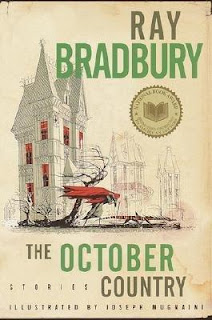When I think of Ray Bradbury, there's always one book that comes immediately to mind.
For most Bradbury fans it might be "Fahrenheit 451" or "Something Wicked This Way Comes." But for me, that one book is "The October Country," recently re-issued by Del Rey in trade paperback format with all of the original artwork.
I believe "Fahrenheit 451" may be one of the most important books of the last century, and there's no denying that "Something Wicked" is a wonderful tale. But if you really want to experience Bradbury at his best, look no farther than the collection of stories in this book.
The strange and bizarre is where Bradbury excels, and "The October Country" contains some of his best short stories.
The tales here range from the creepiness of "The Jar" to the uplifting "Uncle Einar" to the haunting "The Lake" to the just plain strange "The Watchful Poker Chip of H. Matisse." But the stories all have a few things in common. They're all incredibly well written, and they all have a statement to make about the human condition.
It's a shame that Bradbury - like many other good authors who choose to write speculative fiction - is so often pigeonholed into the fantasy/sci fi/horror "ghetto." He truly is one of the best writers of the 20th century.
Just read a story like "The Dwarf," which really has no fantastic elements at all. Instead, it's a tale of human cruelty and its results. A story in which the "monster," much like in the real world, is just an ordinary Joe.
Likewise with the bizarre "Watchful Poker Chip of H. Matisse." The story isn't strange because of some fantastic ghost or monster, but rather because of the extreme lengths the main character goes to remain the center of attention.
Whether it's the crowd mentality, the desire to be popular or the longing for something that can't be had, Bradbury is an astute observer of human nature. He puts those observations to good, and often disturbing, use in "The October Country."
Though his output may have slowed in recent years, Bradbury's older stories still stand the test of time. Most of these tales were written in the 1940s and '50s, and they're just as entertaining and thought-provoking in 2002.
If you're looking for an introduction to Bradbury, "The October Country" is an excellent place to start. If you're a fan of good stories with a bit of weirdness, I'm sure it won't be where you stop.


No comments:
Post a Comment